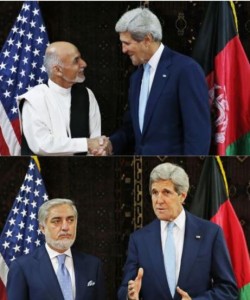What is behind the fear of ISIS in the West? The ISIS crisis in Iraq and its parallel in Syria challenges both governments as well as the status quo in the Middle East. But why would people believe that this band of fighters is an existential treat to the West? Attorney General Eric Holder shared his alarmism yesterday that the threat from ISIS is:
…more frightening than anything I think I’ve seen as attorney general
ABC News headlined “See the Terrifying ISIS Map Showing Its Five-Year Expansion Plan,” with the black flag of the Caliphate spreading like spilled crude oil across Africa, Central Asia, the Balkans, and Spain.
Lt. Gen. Joseph L. Votel, head of the Joint Special Operations Command, told the Senate Armed Services Committee last week:
There’s risks to allowing things just to try to resolve themselves, particularly when there are interests that could affect our country…
All of this jowl-shaking goes on while the Obama administration is tumbling to the fact that there is no on-the-ground military option for us. According to a classified report leaked to The New York Times, our top brass believe:
That only about half of Iraq’s operational units are capable enough for American commandos to advise them if the White House decides to help roll back the advances made by Sunni militants in northern and western Iraq over the past month
Since Iraq’s political deadlock doesn’t look like it will be broken anytime soon, the US can’t take Prime Minister Nouri al-Maliki’s Shiite-sectarian side in a war against Iraq’s Sunnis without real repercussions from the billion Sunnis around the world.
But how serious is the ISIS threat? Most estimates say they have a core of perhaps 10,000 soldiers and maybe another 10k of new recruits. They are fighting the Syrian Army, Iranian-backed militias, the YPG, the Peshmerga, Al Nusra Front, the Free Syrian Army, in addition to the “Iraqi army” and Iraqi Shiite militias.
Let’s remember that we couldn’t hold Iraq with 168,000 troops, and the most advanced military equipment on earth. So the chance that ISIS can seize or even temporarily hold portions of Baghdad with some fraction of 10,000 is zero. From Gary Brecher at Pando News:
ISIS is about as scary as your neighbor’s yappy Shih Tzu: all noise and no teeth. Let’s just sober up, for Christ’s sake, and remember we’re talking about a half-assed Sunni militia that couldn’t face up to Assad’s mediocre Syrian Arab Army and still hasn’t found a way to occupy Sunni Iraqi towns that were outright abandoned by the [Iraqi] Army
ISIS is spread quite thin, but the Pentagon’s report says that Iraq’s armed forces and security apparatus are so badly run, so infiltrated with Iranian-backed Shiite militiamen and informers from ISIS, that there isn’t much of an opening for greater US involvement. The report is based on the findings of six teams of American Special Operations forces who were tasked with assessing the Iraqi Army that America trained and equipped at a cost of more than $25 billion.
Yet, in a show of cognitive dissonance, James Dubik, the retired Army Lt. General who oversaw the training of the Iraqi Army in 2007 and 2008, said that Iraq’s security forces could make gains against ISIS even if only half its divisions were effective, but that an advisory effort was very important:
Even if half was whipped into good enough shape, that would be enough to turn the tide
At a July 3rd Pentagon news conference, General Dempsey noted that, while Iraqi security forces were capable of defending Baghdad, they were not capable on their own of launching a counteroffensive and reversing the ISIS gains. So today, the three factions—Kurds, Sunni Arabs, and Shia Arabs—are holding their own, consolidating their turf, not trying very hard to occupy the other groups’ territories.
This is an existential crisis for America?
Did we liberate Iraq, or did we destroy it? If we destroyed Iraq, are we responsible for restoring the infrastructure to its previous capabilities? Taxing ourselves to restore Iraq might teach us that we shouldn’t attack countries that are not threatening us, but we can’t afford to pay that bill.
We have the most advanced military in the world, there is no real second place to us in military might. Yet as a nation, we are failing ourselves. We are down the global ladder when it comes to healthcare, public education, repairing our infrastructure and providing social services. We can’t get out of our own way on policy because of our divided politics. We are the global leader in incarcerating our own citizens.
Why do we look at ISIS and say that they are our existential threat?
Like Pogo said: “we have met the enemy, and he is us”.

